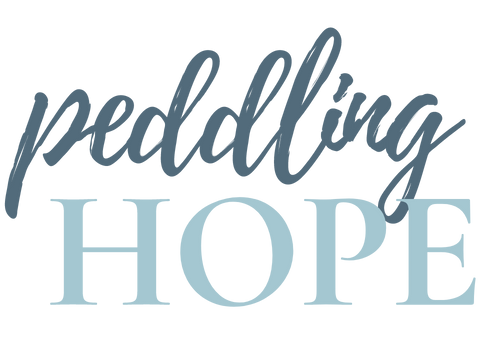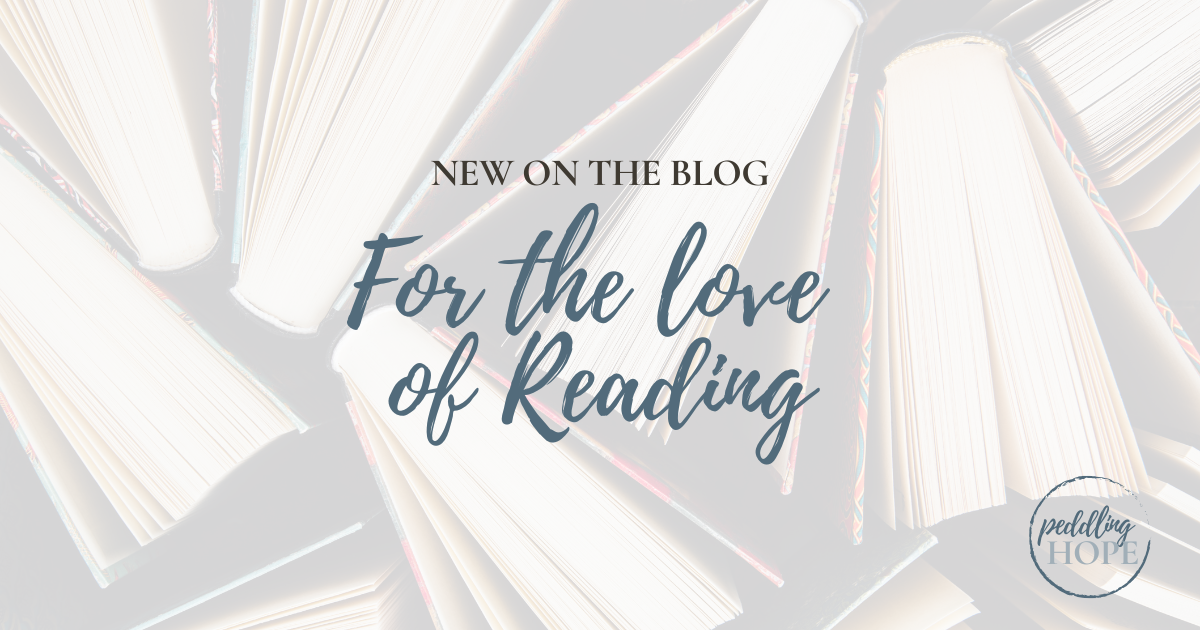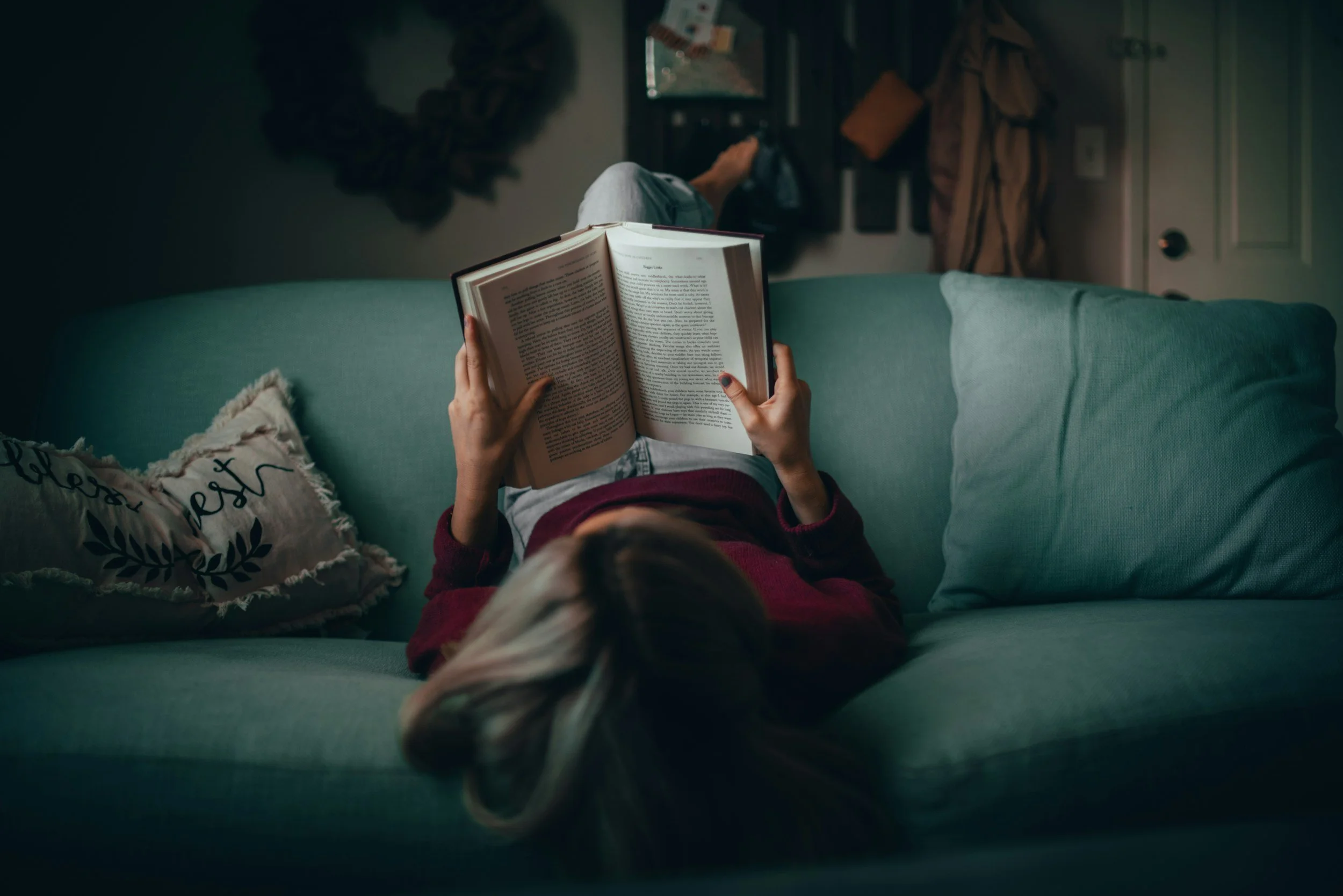For the LOVE of Reading
In my grief counselling course, we did an exercise looking at loss through the lens of what we valued.
For example, which roles do you hold that are most valuable to you? Who are the most important people in your life? What are your favourite activities? And what things do you value most?
One of my most valued things was my books. One of my most valued activities was reading.
This was not always the case for me. Although some readers are drawn to it in early childhood, I was a very late bloomer when it came to reading.
It was not until my early 20s that I picked up a book for pleasure. It took me a long time to read a book at first because it was not a strong skill. I could always read, but my comprehension skills were weak. However, once I picked up my first book, I found myself lost in reading.
A friend of mine, on the other hand, has always been a ‘reader’ at her core. Her e-reader is almost always attached to her hand or in her purse. She reads every spare second of the day. And being a ‘reader’ is a part of the identity she shares with the world.
Sometimes the things we love most take a little time to cultivate, and sometimes they come naturally.
September is Literacy Month
As a nation, Canada does pretty well in literacy. The OECD (Organization for Economic Co-operation & Development) is a collection of 27 countries that score its participating partners in the areas of literacy, numeracy, and problem-solving.
Statistics Canada breaks its rates down by province to see where each one scores. Canada itself is well above the OECD average. Can you guess where Nova Scotia scores? Above the Canadian average, along with BC and Alberta. In fact, all our provinces are above the OECD average.
Just because a person has literacy skills does not mean they read, however.
Do you know the bliss of curling up with a good book on a rainy day? It can be heartbreaking to know not everyone has had that experience.
If you are a person who would love to read but has never caught the passion for it, I want to convince you to try it. You can be a late bloomer too.
Readers come in all shapes and sizes. What kind of reader do you want to be?
Fostering a LOVE of Learning
Readers are often learners. Every book has the potential to teach us something, whether through information, imagination, or insight into the human experience.
For me, historical fiction has always been a doorway to learning.
I’m curious about what it might have been like to live in another time period, so I seek out authors who’ve done the research or who have the imagination to bring those worlds to life. Some of my favourites are:
Clan of the Cave Bear (Jean M. Auel) is a series about living in prehistoric times;
The Red Tent (Anita Diamant) explores the relationships amongst women in the Book of Genesis;
Pillars of the Earth (Ken Follett) is about a stonemason in the 12th century, and
Five Smooth Stones (Ann Fairbairn) is about David, a boy growing up in the rural South in the 1960s. Arguably, my favourite book of all time.
I also love self-help books when they are well written. Many are written by practitioners or experts, but they often double as memoirs. Stories of struggle and growth that teach us through lived experience. Books like Man’s Search for Meaning (Viktor Frankl) are a good example. Frankl was an expert in his field, but he was also a Holocaust survivor with a deeply personal story to share. His work is a reminder that while we cannot always choose our circumstances, we can choose how to respond to them.
The truth is, reading shapes us in different ways.
You may fall in love with an author and devour everything they’ve written simply because their voice resonates. Or you may commit to a book series and learn from the unfolding story over time.
The books you choose (or that choose you) are deeply personal. They can challenge your thinking, expand your perspective, or stir your imagination.
Good books change you.
So, how do you get started?
Reading Strategies
What type of book calls to you?
If you want to foster of love of reading, what things are you interested in learning about? What types of movies or shows do you like? Perhaps begin there. Thriller, romance, documentary? You may want to read the book if you loved the movie.
You can read the books your kids are reading so you can discuss them. Or maybe there were books your friends read in junior or senior high that you never read. Go ahead! There is no age limit on books we may love.
Ask friends for recommendations
One of the easiest ways to find your next read is to ask people you trust what they’ve enjoyed.
Reading something a friend has read gives you the chance to talk about it afterward, like discussing a good movie you’ve both seen.
Just remember to choose books that really interest you, not only the ones your friends talk about. Their excitement might be contagious, but it’s important that the story also appeals to you.
Book clubs are also a good place for inspiration and motivation. Reading can be a great community experience. If you join or start a book club, be sure there are guidelines so you are reading things that excite you and not someone’s required school reading (unless it sounds really good!). Some book clubs also have a page limit so people can get through the chosen books in the time allotted.
Read a little, then decide
If you’re the type of person who hates leaving things unfinished, the thought of putting down a book partway through can feel almost impossible. But not every book will hold your attention, and forcing yourself through one you’re not enjoying can take the joy out of reading altogether.
That’s why I use what I call the “50-page rule.” If I’m not gripped in the first 50 pages, I’ll put the book down. It may be in the first chapter if I’m not following the writing style or the characters feel a little shallow.
Letting go of a book doesn’t make you less of a reader. In fact, it gives you the space to find a story you actually connect with. Even if it’s a book club pick, it’s fine to move on.
Think of it this way: you’re not quitting, you’re choosing. And choosing joy in your reading life makes you more likely to keep turning the page next time.
Include all your senses
Do you have a place to read? I have a giant chair I bought on Marketplace specifically for reading. It’s in the corner of my living room right beside my front window. There is a side table for tea, a blanket if I need to feel cozy, a lamp for late nights, and my journal in case I get inspired to write about something I’ve read. There’s also room in my chair for a kitty (or two). Reading is not just about the mind - it is a whole body experience!
Read outside the box
We were taught in school to read from cover to cover. However, it’s up to you to read the way you want.
One of my friends reads the last chapter of a book first. That way, she knows if it is worth investing her time.
I encourage my clients to read around in my book, especially if they are feeling unfocused or are not strong readers. Read the stories I include in each chapter, read the chapter titles and go to the one that feels most urgent.
Diving into the middle of the book is fine. You may go back and read cover to cover, but reading does not need to follow a set of rules.
Watch The Movie First
If you’ve never felt like a strong reader, one way to ease in is by starting with stories you already know. Picking up a book after you’ve seen the movie, or choosing a book that features familiar characters, can make the experience feel less intimidating.
You don’t have to work as hard to picture the setting or keep track of who’s who, because the movie has already painted that picture for you.
Some readers also find long descriptions difficult to follow. And that’s okay. I know people who simply skip them because what matters most to them are the characters and the story. Reading isn’t about following rigid rules; it’s about finding what helps you connect with the material.
Read Your Own Way
You can have more than one book on the go at a time. Just like you might juggle a few TV shows, you can keep different books nearby and choose whatever fits your mood. Some may be light and easy, others may challenge you to learn something new, and a few might be emotionally heavy and best saved for when you’re ready to sit with them.
Personally, I prefer physical books most of the time, but when I travel, I rely on an eReader filled with quick reads for the plane. The point is, there isn’t one “right” way to read.
So, gather a book or a stack, physical or electronic. Decide what calls to you in the moment. And then give yourself permission to sink in and enjoy the simple pleasure of reading on your own terms.




